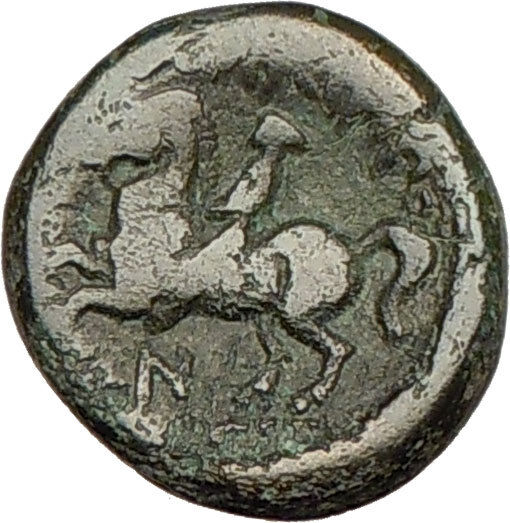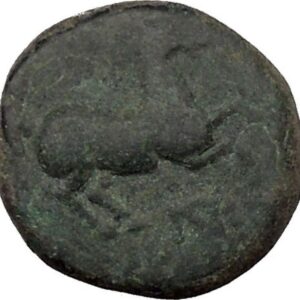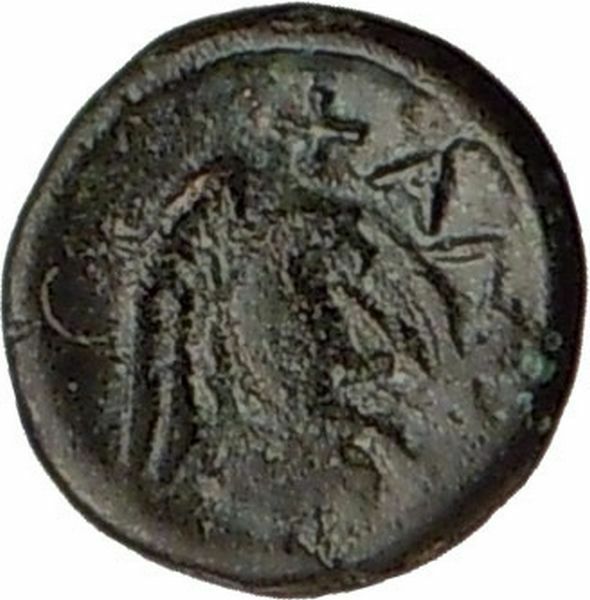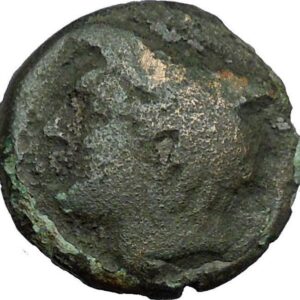|
Greek Coin of Seleukid Kingdom
Demetrios I, Soter – Seleukid King: 162-150 B.C.
Serrated Bronze 14mm (3.56 grams) Antioch on the Orontes mint
Reference: Sear 7028; HGC 9, 833 Rare R3; SC 1646
Horse’s head left.
ΒΑΣΙΛΕΩΣ / ΔΗΜΗΤΡΙΟΥ above and below elephant’s head right.
Son of Seleukos IV, Demetrios was a hostage in Rome at the time of his father’s death and thus unable to take up his inheritance. His uncle, Antiochos IV, seized power in Syria, as related above, and Demetrios had to wait thirteen year in Rome before his chance came to ascend the Seleukid throne. He became something of a recluse in the latter part of his reign, and in 150 B.C. he lost his life in a battle against Alexander Balas, who claimed to be the son of Antiochos IV.
You are bidding on the exact item pictured, provided with a Certificate of Authenticity and Lifetime Guarantee of Authenticity.
Demetrius I (Greek: Δημήτριος Α`, c. 187 BC – 150 BC), surnamed Soter (Greek: Σωτήρ – “Savior”), was a ruler of the Hellenistic Seleucid Empire. He had been sent to Rome as a hostage during the reign of his father, Seleucus IV Philopator. After his father’s death in 175 BC, Antiochus IV Epiphanes took advantage of Demetrius’ captivity to seize the throne. Demetrius escaped from confinement and established himself on the Syrian throne (162 BC) after overthrowing and murdering King Antiochus V Eupator, his cousin.
Demetrius acquired his surname of Soter, or Saviour, from the Babylonians, whom he delivered from the tyranny of the Median satrap, Timarchus. Timarchus, who had distinguished himself by defending Media against the emergent Parthians, seems to have treated Demetrius’ accession as an excuse to declare himself an independent king and extend his realm into Babylonia. His forces were however not enough for the legal Seleucid king: Demetrius defeated and killed Timarchus in 160 BCE, and dethroned Ariarathes, king of Cappadocia. The Seleucid empire was temporarily united again.
Demetrius is famous in Jewish history for his victory over the Maccabees.
Demetrius’ downfall is attributed to Heracleides, a surviving brother of the defeated rebel Timarchus, who championed the cause of Alexander Balas, a boy he claimed was a natural son of Antiochus IV Epiphanes. Heracleides convinced the Roman Senate to support the young pretender against Demetrius, who was defeated and killed in 150 BC.
 The Seleucid Empire was a Hellenistic state ruled by the Seleucid dynasty founded by Seleucus I Nicator following the division of the empire created by Alexander the Great. Seleucus received Babylonia and, from there, expanded his dominions to include much of Alexander’s near eastern territories. The Seleucid Empire was a Hellenistic state ruled by the Seleucid dynasty founded by Seleucus I Nicator following the division of the empire created by Alexander the Great. Seleucus received Babylonia and, from there, expanded his dominions to include much of Alexander’s near eastern territories.
The Seleucid Empire was a major center of Hellenistic culture that maintained the preeminence of Greek customs where a Greek-Macedonian political elite dominated, mostly in the urban areas. The Greek population of the cities who formed the dominant elite were reinforced by emigration from Greece. Seleucid expansion into Anatolia and Greece was abruptly halted after decisive defeats at the hands of the Roman army. Their attempts to defeat their old enemy Ptolemaic Egypt were frustrated by Roman demands. Much of the eastern part of the empire was conquered by the Parthians under Mithridates I of Parthia in the mid-2nd century BC, yet the Seleucid kings continued to rule a rump state from the Seleukid Kingdom until the invasion by Armenian king Tigranes the Great and their ultimate overthrow by the Roman general Pompey.
|





 The Seleucid Empire was a Hellenistic state ruled by the Seleucid dynasty founded by Seleucus I Nicator following the division of the empire created by Alexander the Great. Seleucus received Babylonia and, from there, expanded his dominions to include much of Alexander’s near eastern territories.
The Seleucid Empire was a Hellenistic state ruled by the Seleucid dynasty founded by Seleucus I Nicator following the division of the empire created by Alexander the Great. Seleucus received Babylonia and, from there, expanded his dominions to include much of Alexander’s near eastern territories.




